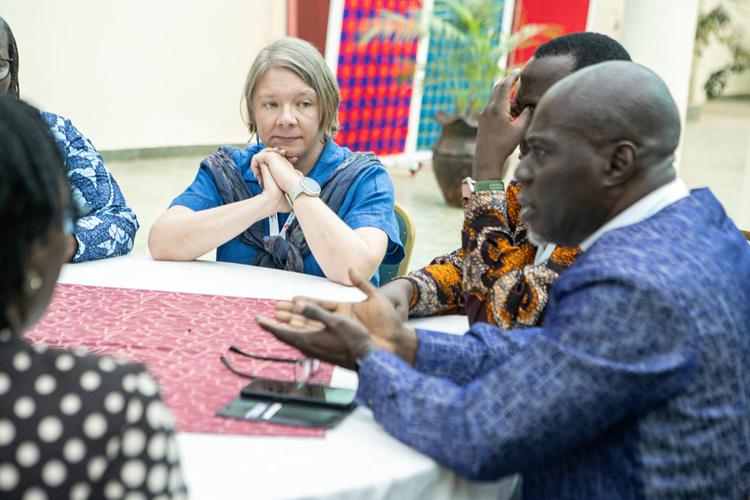Commission moderator Rev. Michael Blair said that the first face-to-face meeting was both powerful and energizing. "The context and framing of the gathering provided an experience of the contours and texture of the theme 'Preparing the Way: mission as Counter Creating,' " he said. "It was important for this meeting to take place on the African continent and particularly Kenya, a neighbour of Tanzania, provided a connection to the 2018 Arusha Conference and its calls, which will be a key part of the ongoing work of the commission."
Blair noted that ongoing protests in Kenya provided a lived example of counter-creating and an example of a strategic and focused approach to addressing the injustices of political corruption and poverty.
"The opportunity to work collaboratively, with other commissions, programme areas of the WCC, and mission agencies provided an imaginative space for the work of counter-creating—lots of insights and excitement about the possibilities of what we can do together," Blair said. "The commission has identified spaces where they would like further exploration of possibilities of collaboration."
He also noted the 25th anniversary of the WCC Ecumenical Disability Advocates Network. "What a gift as we continue to work towards a world where everyone has a place where they are valued and honored," he said. "A highlight of the meeting was the building of the community."
Rev. Dr Peter Cruchley, the commission's director, rejoiced at the energy, commitment, and creativity."We have been waiting and hoping for this moment, and it has been even more than we hoped for and expected," he said.
Meeting overview
The commission met from 5-11 July, at the All Africa Conference of Churches headquarters in Nairobi. The participants, including theologians, heads of church institutions, religious scholars, and church leaders, among others, centered their discussions around questions related to colonialism, decolonization, reparations, and restoration in the context of mission and evangelism.
Earlier, on 6 July, the participants held a land acknowledgement ceremony, recognizing the Maasai Indigenous community as the traditional owners of the land in Nairobi. The symbolic invocation honoured and blessed the traditional owners of the land on which the commission met.
Biblical visioning
Cruchley said the commission had met to put together a vision of transforming discipleship—according to a call at the Conference on World Mission and Evangelism in Arusha—to think of ways to de-colonize mission.
"So, we are really working on what is de-coloniality and not in those political terms, but on a biblical vision of a new world rooted in Christ and what that means in practice. And I think that has been the kind of golden thread, throughout our time…" said Cruchley.
Three working groups
In this first meeting of the commission, Rev. Dr Kuzipa Nalwamba, WCC programme director for Unity, Mission, and Ecumenical Formation said that three working groups were constituted.
"In all, it has gone on well," she said. "So, in terms of building community of people who are going to generate the content, I think we have built the necessary rapport, and also in terms of mapping the way forward."
A group on mission and reparative justice will focus on deepening ecumenical mission theology as a reparative force against colonization and marginalization. A group on spiritualities and practices will focus communities' transformation and their wisdom, which reshapes mission practices. A third group, focusing on evangelism, will explore how evangelism in practice brings hope in times of crisis and challenge.
Rev. Dr Fidon Mwombeki, All Africa Conference of Churches general secretary, said he was very positive about this conceptual stage and was now pondering Africa's contribution in understanding and in mission.
"Africa has a lot to offer in the way we do mission, the way we emphasize in proclamation and preservation of the Christian faith, which I am going to continue insisting," he said.
Earlier, Rev. Dr Ezekiel Lesmore, All Africa Conference of Churches director of programmes, told the gathering that African mission needs to drive care of creation, ecological and economic justice, peace-building, gender justice, good governance, conflict prevention and mediation, and deepening democratic culture.
"It should make the church restless and eager to confront systems and structures that are denying the experiencing fullness of life for all," said Lesmore.
Christianity is growing fastest in Africa but, Mwombeki said, while mainline churches were growing organically, they were absent in the public square.
"We hear all these theologies on radio, TV, internet, Twitter, and YouTube, but the mainline churches are actually not acting. We are saying we need to pay attention," he said. "We must do something, as we are talking about counter-creating. We should prepare the appropriate technology and go into the public space."
After meeting near the Rift Valley, the cradle of humanity, and in Africa, the commission will meet next in Jamaica in 2026.
Originally from the World Council of Churches
CCD edited and reprinted with permission












